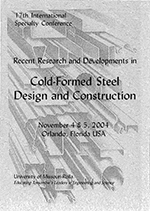Session Dates
04 Nov 2004 - 05 Nov 2004
Abstract
This paper tries to enlighten the subject of (numerical) plasticity by presenting fundamental theory and some very practical examples. For a two-dimensional plain stress state, a Hubert-Henky yield criterion is derived. The flow rule is discussed, including an explanatory numerical example. The yield criteria and flow rule are theoretically applied in a four node finite element. This element is used to show some of the conditions and limitations of a plastic calculation in the finite element method. Finally, a real finite element calculation is made for illustrating the theory derived.
Department(s)
Civil, Architectural and Environmental Engineering
Research Center/Lab(s)
Wei-Wen Yu Center for Cold-Formed Steel Structures
Meeting Name
17th International Specialty Conference on Cold-Formed Steel Structures
Publisher
University of Missouri--Rolla
Document Version
Final Version
Rights
© 2004 University of Missouri--Rolla, All rights reserved.
Document Type
Article - Conference proceedings
File Type
text
Language
English
Recommended Citation
Hofmeyer, Herm, "Introduction to the Theory and Finite Element Implementation of (Steel) Plasticity" (2004). CCFSS Proceedings of International Specialty Conference on Cold-Formed Steel Structures (1971 - 2018). 10.
https://scholarsmine.mst.edu/isccss/17iccfss/17iccfss-session2/10
Introduction to the Theory and Finite Element Implementation of (Steel) Plasticity
This paper tries to enlighten the subject of (numerical) plasticity by presenting fundamental theory and some very practical examples. For a two-dimensional plain stress state, a Hubert-Henky yield criterion is derived. The flow rule is discussed, including an explanatory numerical example. The yield criteria and flow rule are theoretically applied in a four node finite element. This element is used to show some of the conditions and limitations of a plastic calculation in the finite element method. Finally, a real finite element calculation is made for illustrating the theory derived.



